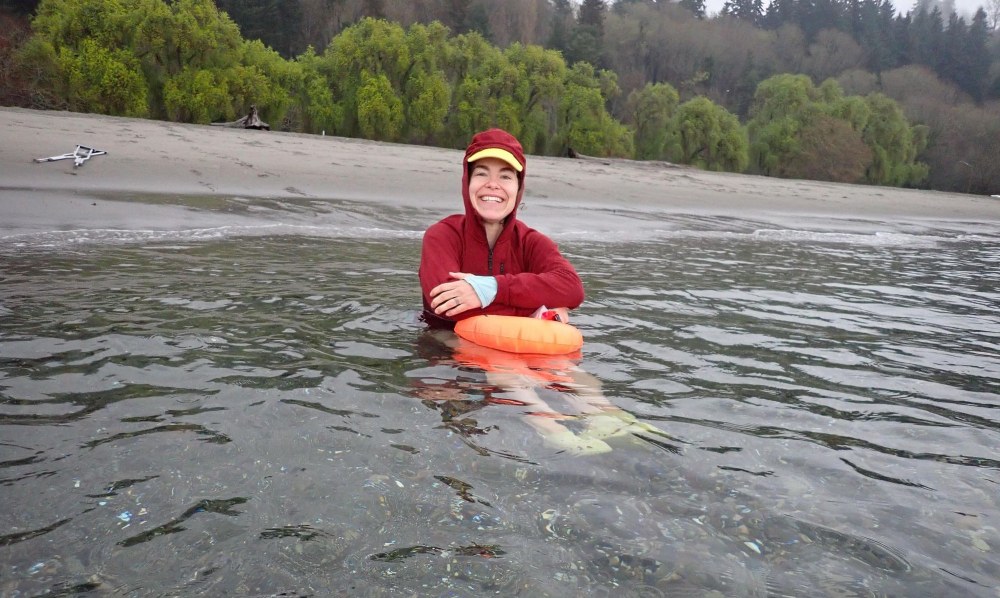
I’m injured. Again. This time it’s bad. An ordinary posthole on a scramble resulted in seven separate tears in my knee.
This injury would be plain bad luck if it wasn’t one of a series. In the last three years, I’ve broken my foot and torn the cartilage in my elbow. How did I get here?
Part 1: Overtraining
I hate resting. I’ve been lectured on its importance, how exercise causes microtears in muscle and stillness allows the fibers to reknit stronger than before. My friends tell me I act like a shark that will die if I stop moving. Why have I resisted something as necessary as rest?
FOMO
The PNW is a giddy playground: cliffs to climb, mountains to scale, sea to swim. It’s just so darn fun to move outside, and even better to do it with The Mountaineers community. Resting requires missing out on time with friends, pika sightings, the thrill of topping out… Cranky knees and sore feet are like kindergarten teachers announcing the end of recess. I want to ignore them, to keep playing.
Mental Health
I’ve been trying to outrun, outhike, and outclimb my anxiety and depression. I’m afraid that if I sit still, despair will catch up and consume me.
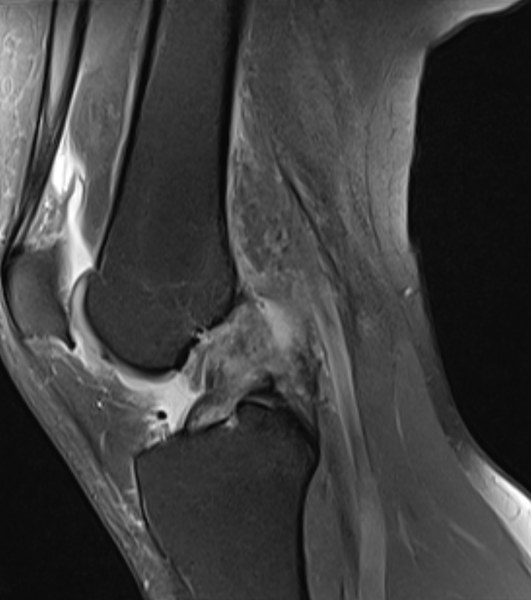 The MRI revealing tears in Lauren's knee. Photo courtesy of Lauren Allen.
The MRI revealing tears in Lauren's knee. Photo courtesy of Lauren Allen.
Imposter Syndrome
Right before I postholed, I thought, that snow looks a bit sketchy. But as a woman climb leader, I was afraid that voicing my concern would make me look weak. I felt eager to prove that I belong, that I deserve my title.
Compare and Despair
Facebook allows me to see buddies climb Rainier and Baker back-to-back. Bike centuries then crush it at Index the next day. The Mountaineers is full of amazing athletes who have the ability to go at it every day, seemingly with no negative consequences. Only now am I realizing that what is fine for one Mountaineer, might be overtraining for me.
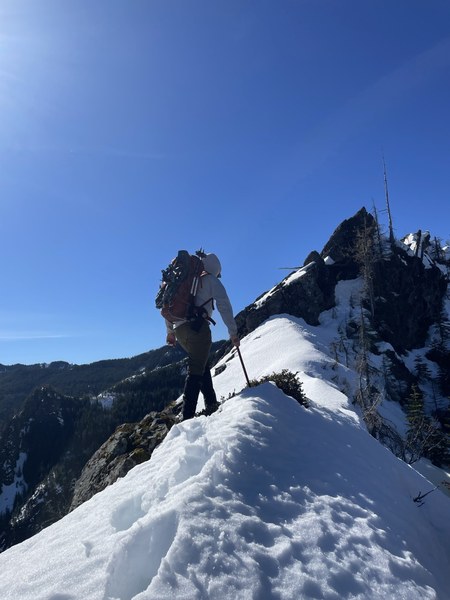 Lauren's scramble buddy ascending toward Easter Island. Photo by Lauren Allen.
Lauren's scramble buddy ascending toward Easter Island. Photo by Lauren Allen.
Part 2: Undereating
“Your BMI is too high. You need to start eating right and exercising,” my (former) doctor said.
Trying not to cry, I tell her I eat mostly meat and vegetables, exercise every day, and can do a hundred pull-ups. She wrinkles her nose in response.
Since recovering from a bad bout of high school anorexia, my body mass index (BMI) has ranged from “overweight” to “obese.” BMI is not an especially useful measurement. It only takes into account height and weight, not fat versus muscle/bone, for instance. I’ve inherited a sturdy body type. With these genes, a healthy weight for me is higher than the standardized charts. I know this, yet I feel guilt and shame for not conforming to the standards.
There has been a lot of hype over paleo, keto, various re-brandings of the Atkins diet I remember from my ninety’s childhood. Over the last few years, I’ve mostly cut carbohydrates, but I often feel hungry and tired.
“Undereating obviously isn’t an issue,” my (former) physical therapist said after I asked why I’m getting injured all the time. I didn’t ask what he meant, but I assume he was implying that a person with such a high BMI can’t possibly be under-fueling their activity level.
My nutritionist thought otherwise and diagnosed me with “inadequate energy intake.” I needed more total calories, and especially more carbs. The nutritionist explained that carbohydrates are the body’s preferred source of energy because, without carbs, it’s difficult for the body to incorporate amino acids into muscle repair. Adequate carb intake is especially important after an injury.
Part 3: Bad Luck
Being injured sucks. I blame myself for overtraining. I blame myself for undereating. But even well-rested, fit recreationists tear up their knees. Injuries are a common part of being active, especially in the high-risk pursuit of mountaineering.
Self-flagellation is not helpful. I need to move on. But what does “moving on” look like when one can’t even move?
Part 4: Learning how to rest
For the first few weeks during my recovery, I would drive to Golden Gardens, carefully crutch across the sand, and sit in the cold Salish Sea. Cryotherapy and a way to get my heart rate up, I told myself. I cried a lot. For pain. For loneliness. For the shame that I couldn't move and eat without hurting myself. I felt I lacked the basic skills even a crab possessed.
As a science teacher, I know that the universe tends towards entropy. It is easier to break than it is to heal. I am getting older, and things are not working as well as they once did. Physics isn't personal.
I was forced to sit with these feelings. They made me sad, but I did not succumb to despair. Instead, I used the extra time to reflect on my old patterns, like the pressure to rush, to maximize daylight, to achieve the objective. Through the stillness of recovery, I realized that being forced to slow down offers unexpected benefits.
Appreciation of Nature
At Golden Gardens I watched seals and sealions play. I saw alpenglow dance across the Olympic Mountains. At home, I hung a hummingbird feeder in my backyard and watched the unfolding drama of the fierce little birds competing for space. There are delightful pockets of nature all around me.
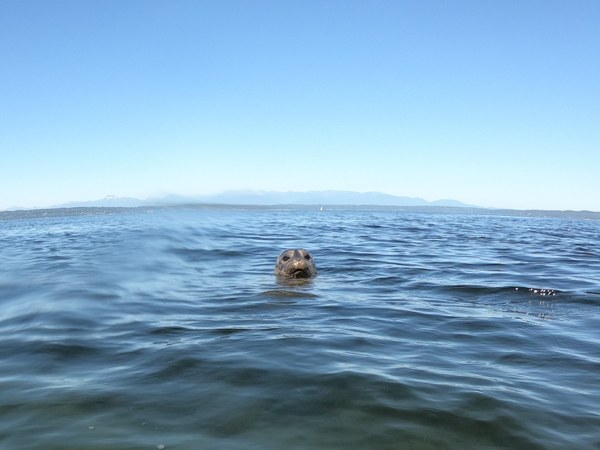 A curious sea lion at Golden Gardens. Photo by Lauren Allen.
A curious sea lion at Golden Gardens. Photo by Lauren Allen.
New dimensions to relationships
I met my husband on a climbing trip. Our wedding rings are tattooed figure-eight knots. We are each other’s favorite climbing partner. My injury reminds me that I am married to Sergey, not climbing – that we can connect in different ways, from board games to chatting lazily on the couch.
I’ve met many of my buddies on Mountaineers climbs. I feared that I would be completely isolated while everyone else was playing in the mountains, but that was not the case. Everyone needs rest days. Also, I have more time now to connect with non-climbing friends.
A new way to travel
Sergey and I went to Greece on what was supposed to be a climbing trip. We brought my wheelchair. He wheeled me around museums, and I was able to slowly explore ancient sites using my cane. I learned about history, ate delicious food, and soaked up the landscape rather than racing through it.
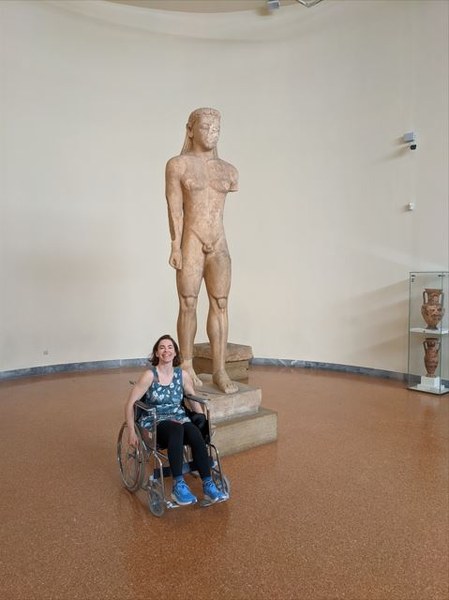 Lauren wheeling through the Heraklion Archaeological Museum. Photo by Sergey Shelukhin.
Lauren wheeling through the Heraklion Archaeological Museum. Photo by Sergey Shelukhin.
Other Hobbies
I am more than my climbing grades or my Peak Bagger list. Pre-injury, a lot of my self-worth was wrapped up in red points and tick lists. This focus detracted from joy.
I decided to stop trying to prove myself through hobbies. For example, I took up drawing and painting animals. The activity gives me a sense of flow and satisfaction. Even if the picture turns out ugly, time observing creatures is always well spent. I also started singing loudly in the car, experimenting with a rotisserie chicken bone broth soup recipe, and working my way through a book of crossword puzzles. I’m not achieving anything noteworthy through these hobbies, but I am enjoying myself.
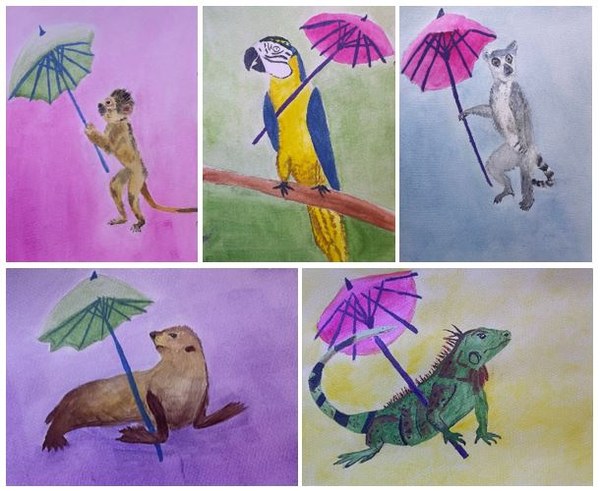 Lauren's "Tiny Umbrella" artwork series. Photo by Lauren Allen.
Lauren's "Tiny Umbrella" artwork series. Photo by Lauren Allen.
Part 5: Where do we go from here?
Mountaineers badges reflect skills and achievements. I wonder if there could be a “rest and recovery” badge, a way to commend members for taking care of themselves, which can be hard to do in such an active crew. Creating a community around rest could be a way for injured Mountaineers to connect and support one another so that injuries don’t have to be isolating.
I hope you can learn from my overtraining and undereating mistakes. And that you know when injuries happen, you’re not alone.
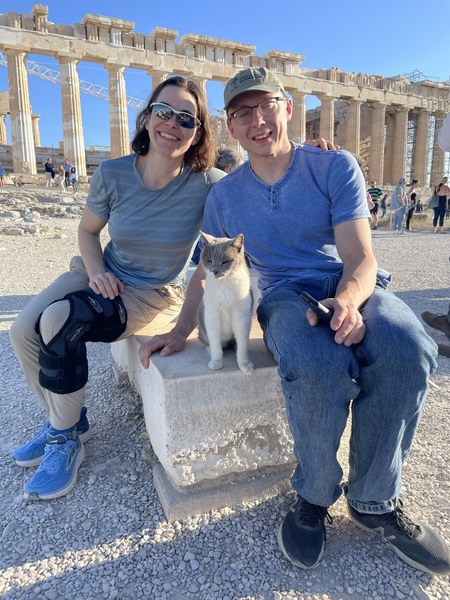 Lauren, husband, and new feline friend at the Acropolis. Photo courtesy of Lauren Allen.
Lauren, husband, and new feline friend at the Acropolis. Photo courtesy of Lauren Allen.
Add a comment
Log in to add comments.Absolutely fantastic! Thank you for writing this, sharing it with us.
That FOMO, overtraining, mental health and compare and despair syndrome is alive and well in our Club!
Thank you so much for this. I can relate to much of what you shared. My overtraining led to a summer in a walking boot while friends went on my dream trip. I’m finally starting to listen to the little signals and build in rest days. I did not know about carbs and injury repair. That’s important info!
Also appreciate your comments on undereating. Have been on many a trail run where I hit a wall - trying to get better at managing heart rate and carb intake.
Thank you for sharing, Lauren. I can relate to so many of the issues you identified. Wishing you a good recovery.
Great job at being mindful then having realistic expectations about what we challenge out of our bodies on a day to day basis. Recovering from a severe hamstring injury several years ago, I am finding I may never get back to where I was again. My PT said I may never run again, and running takes me to the mountains in the summer. It was crushing to hear. Okay, I cried and then stopped comparing. There will always be someone faster, smarter, and better~crazy cycle. Finally, my body was right, rest when it tells me too, eat carbs and maybe add BCAA and some love, taken daily :)
I loved this article! I want the Rest Badge!
 Lauren Allen
Lauren Allen